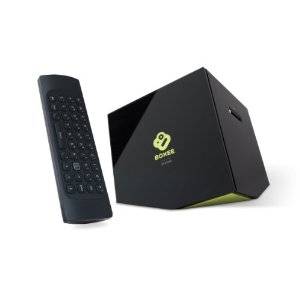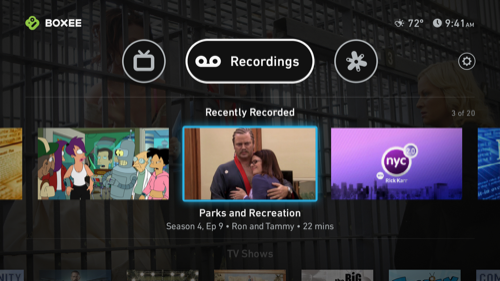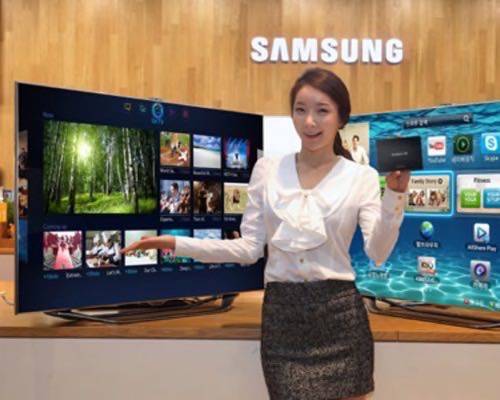
The unexpected news that Samsung has acquired the video-startup Boxee—reportedly for $30 million—is supposedly a plus for the South Korean company’s smart TV plans. In fact, though, it’s a likely death sentence for a much-loved start-up’s technology—and one that isn’t likely to do much for Samsung, either.
Meet Boxee

Boxee, which started out focused on video streaming software, teamed up with D-Link last year on a hardware set-top box for digital video streaming. Basically, the Boxee Cloud DVR (formerly known to its adherents as the Boxee Box), like its rival Roku, is a simple and relatively inexpensive box that brings streaming video services like Netflix and Amazon Prime to your TV.
While it never really gained traction in the mass market, the company has a staunch base of fans who have been loyal for years.
The company still needed an influx of cash, and just a couple of weeks ago, it was reportedly seeking a buyer or at least $30 million in funding. Clearly, it found both in this lightning deal. But whether this is what the 6-year-old startup bargained for is another matter.
Now Get Ready To Say Goodbye
Neither buyer nor seller are talking details yet. When I reached out to Boxee for comment, I received this:
We can confirm that Boxee will be joining Samsung. We’ll have a formal statement on our website later this week. For any additional information please contact [name redacted] from Samsung PR …
And Samsung offered a standard PR blurb:
Samsung has acquired key talent and assets from Boxee. This will help us continue to improve the overall user experience across our connected devices.
The first comment merely directs all inquiries to Samsung. As for the latter, the tech giant’s statement holds no assurances about the startup’s continued operation or hints of how its 45-person team—located in New York and Tel Aviv—will work under the corporation’s management. But it does make clear that the deal helps Samsung, not Boxee, improve its user experience.
That doesn’t bode well for anyone hoping to see future Boxee Boxes (or Cloud DVRs, or whatever the startup might have ended up calling its streaming-video gadgets).
Samsung’s Dumb Plans For Smart TV

Samsung has been trying to turn its smart TVs into household items for years. The corporation featured its Internet-connected sets heavily at the Consumer Electronics Show in 2012 and again this year. But if it thinks the secret to success lies in integrating Boxee’s software with its new voice-powered “S Recommendation” and Smart Hub interface, it has a rude awakening in store. User interface is not the product category’s major problem.
Although there’s no question that the menus, prompts and, now, S Recommendations are confusing to the average TV viewer, the price of these sets poses the biggest barrier to entry. At thousands of dollars, these televisions are simply cost-prohibitive for the average family.
And unlike smartphones, which tend to be upgraded every year or two, customers usually hold on to their televisions for years on end—which means users who buy into today’s hot, new TV technologies can get saddled with them long after they’re obsolete.
See also: The Smart TV Is Dead. Long Live The Second Screen
Of course, that assumes consumers want their TVs to be something more than just televisions in the first place. Research firm NPD Group doesn’t quite buy it. In its December 2012 study, it found that more than 40% of U.S. households with smart TVs don’t even hook them up to the Internet.
That’s an industrywide issue—other TV makers from Panasonic and Sony to LG and Vizio face the same conundrum. But in this case, Samsung appears willing to sacrifice a potentially promising startup to its failed vision of making smart TVs that people will actually want to buy. Because it’s difficult to imagine what other use it could put those “talents and assets” toward, but not hard at all to envision them disappearing within Samsung’s cavernous TV division without a trace.
All Boxe(e)d Up
There’s a long tradition of companies buying up small businesses to advance their own services or features, only to wind up killing them. Just ask PhotoForge developer GhostBird (bought by Yahoo), Lala (purchased by Apple) and Bumptop (snapped up by Google). All of these startups were nixed by the major tech companies that bought them. And soon, a new business will likely join their ranks.
If you’re a Boxee fan, you have our condolences.

















